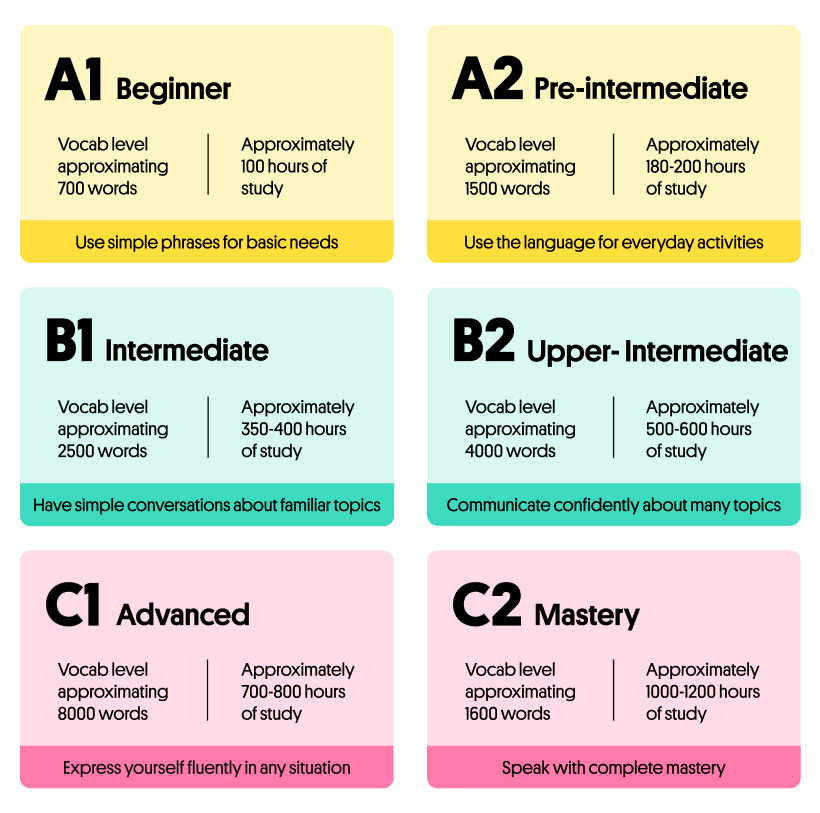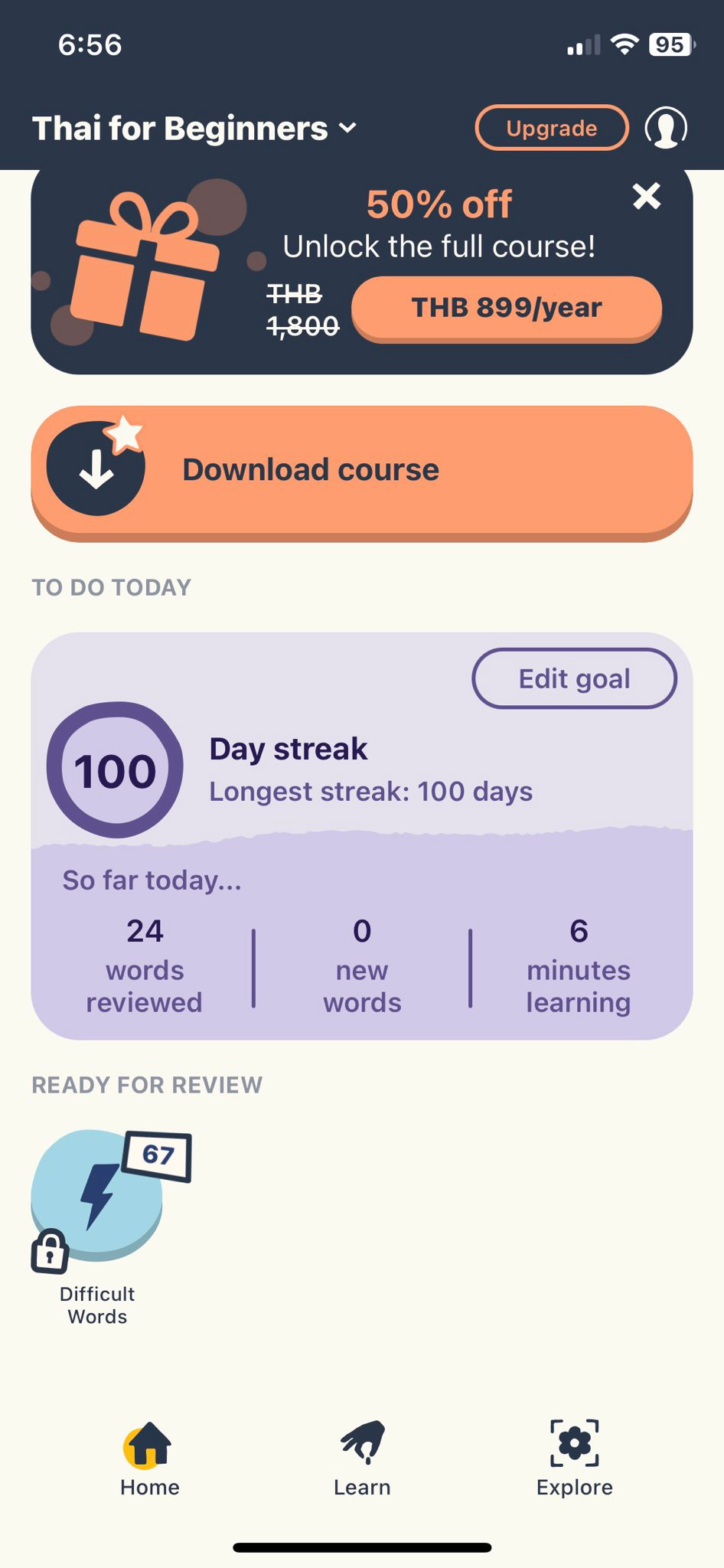Learning Thai (165 Hours): Reflection & Lessons Learned
Since December 2020 I’ve been learning the Thai language. While I’m no where near proficient yet, I’m at the point where I can have some conversations beyond ordering food at restaurants with people who don’t speak English.
If we assume Thai is similarly difficult to English, then this Preply diagram based on the EU language levels suggests perhaps I’m at A2, though I manage to stretch the limited vocab I have to around B1:

Anyway, I’m writing this before I get too deep in my journey and let another 5 years pass without reflection. I want to do a quick recap of my journey so far in case anyone wanted some ideas on how to go about learning Thai themselves.
Here’s my learning journey recap:
1. Motivations
Everyone has their reasons. These are mine:
Survival. Accidents and fights happen (verbal). I’d like to know enough Thai to be able to handle myself when things go wrong, without someone needing someone to speak on my behalf. Also helps that you can’t get tricked so easily if you know what people are talking about.
Making friends. Learning Thai would help with making local friends.
Competition. An odd one but motivating. In 2017 when I got to Korea, many of my close friends started learning with me around the same level. 4 of them, out of the group of 5 including me, reached TOPIK6 level in Korean, the highest. 2 of them even ended up on TV. Somehow, I didn’t want this to happen to me again in Thailand with the Thai language.
The anti-goal of not becoming a frustrated farang at a bar somewhere. I’ve always had this in my mind to NOT become some kind of creepy uncle that scares kids at weddings, stuck in an unintegrated, low-achievement farang bubble. Withering away in a Pattaya go-go bar…
2. Timeline
Here’s a recap timeline of how my learning journey went.
2020
Traveled to Thailand during lockdowns and wanted to start learning the language from knowing nothing about it.
Bought a starter pack from Tutoroo (link). The learning was super inefficient and ineffective but let’s count it anyway. I paid 750 THB per 1.5 hours lesson, 2 lessons upfront. Renewed maybe 2-3 times? So I guess that’s 9 hours.
I was in and out of Korea every few months this year.
2021-2022
Basically gave up on Thai for the most of 2021.
But in December 2021 I enrolled with Rapid Learn Thai (link), buying 2 rounds of 10k THB at 500 THB a lesson. 40 hours.
2023
Felt a renewed focus on learning Thai.
Did 200 days of daily study, before breakfast while exercising. Probably the minimum effort on Memrise which I think is 15 minutes. 200 x 15 minutes / 60 = 50 hours.
At some point, I was reviewing vocab on the train on the way to work. I’m guessing I did this for about 3 months, each workday. 20 work days a month x 3 months x 10 minutes = 10 hours.
2024
Moved to Chiang Mai for 3 months and made a routine to study about 30mins every morning with breakfast, each work day. I assume I missed about 1 day per week by being sloppy. 12 weeks x 4 days x 0.5 hours = 24 hours.
Spent 6,745 THB for 20 lessons, 1 hr each. 20 hours.
I assume I spent at least 30 minutes study per hour with the tutor. Yes I’m a lazy student. 10 hours.
⭐ This is when my Thai really improved. I changed my technique to just speaking with my tutor for 1 hour about anything, using English only for words or expressions I didn’t know. Any words I didn’t know were written down for study later.
2025
Bought a book, Complete Thai Beginner to Intermediate Course (link). Bought to see if it can fill in the gaps of my learning to date. But unsure if this will work yet.
4 dedicated study sessions in Jan/Feb (ugh, too few). Approx 30 minutes study time. 2 hours.
Not yet in the habit of studying vocab on the way to work again, but probably done this 2x at 10 minutes each. 20 minutes.
Total stud time: approximately 165.3 hours.*
*Obviously doesn’t include passive time spent listing to Thai being spoken around me while being in Thailand.
3. Learnings
In the early stages, a structured introduction class would have been a more efficient way to learn the base layer of the language.
From the start I knew I couldn’t commit to a class based on my experiences learning Mandarin and Korean. My schedule often changes and unfortunately I tend to get sick often and easily. So studying only with tutors was my way to make learning flexible.
Sadly, this turned out to be one of the major things that made my learning time less efficient. Many tutors lacked a robust beginner learning process which would have been super helpful to get started. We’d cover a few key phrases but it didn’t feel like it went smoothly or properly built upon each other. It was more like going through a Lonely Planet guide of key phrases.
While I got through the total beginners stage eventually, it could have been faster. I still couldn’t have done it via a class, but maybe you can.
Learning reading early is a strong learning multiplier. But it’s just a multiplier, not a replacement for learning vocabulary and grammar.
In my early lessons with my tutor, I really felt like I wanted to learn more reading and writing as went.
I was worried I’d make the same mistake as I did with Mandarin, where I was guided to learn speaking and listening first - and would eventually come around to reading and writing later. That was a big mistake because while I could speak and understand (to approximately HSK 1.5 level), it was less useful because I couldn’t read basic signs in the Subway, restaurants or other places in daily life. Which sucked.
Having known that, I saw Rapid Learn Thai recommended in some Facebook group as a way to learn reading and writing first so I enrolled.

Gary Orman, the creator of the Rapid Method, makes several good arguments for learning reading first, too:
You can understand tones, so you speak more properly
You can read common words and naturally acquire more vocabulary
Looking back, I’ve found these 3 points (include mine above about reading in daily life) to be true in real life. Learning to read does make your pronunciation better because you’re reading the tones correctly. And reading helps you pick up words you see around the place, like หยุด! (Stop!).
One key problem I noticed though was that even though I was studying reading and speaking with the tones, I didn’t really know… anything? I couldn’t make sentences and I didn’t know common words. This actually got me into trouble once (ask me privately if you want to know how).
That’s when I realized that learning to read and pronounce Thai was just a speed multiplier for other learning. A nuance that I didn’t think of before I started.
Don’t forget energy management as part of your learning plan. Learning when I was tired probably reduced my efficiency 85%.
This was a big one. Because I could schedule tutors whenever I wanted, I often took lessons between things at work or after it. The problem was, I was usually completely toasted by the time I took the lesson.
It felt like nothing stuck and I couldn’t wait for the lessons to be over. I liked all my tutors, so it wasn’t their fault, I was just a crap, demotivated student.
It would have been better to schedule lessons only when I was feeling fresh at the beginning of the day. Sadly that hasn’t been practical for me, but it may be for you!
My number 1 study tip is to develop and refine a study habit.
Wrapping this up, my final lesson would be that the most important thing I did to improve my Thai was to develop refine a study habit.
First I thought of all the moments of the day where I could tack on some Thai study. Then I tested different methods to see what I could stick to. Over time, I’d try adapt my routine so that I did that every day, work or no work. This was how I got in two massive chunks of consistent study of 40 and 24 hours respectively.
Interesting resources:
Journey: The Language Learner's Ultimate Guide to Maintaining Motivation by Erin N. O'Reilly (Link). I talked to Erin once for a strategic language learning consultation and she really, really knows her stuff.
Language Lords on YouTube (Link). This dude is a machine at learning languages and has some really interesting, and motivating, techniques. Check him out.




